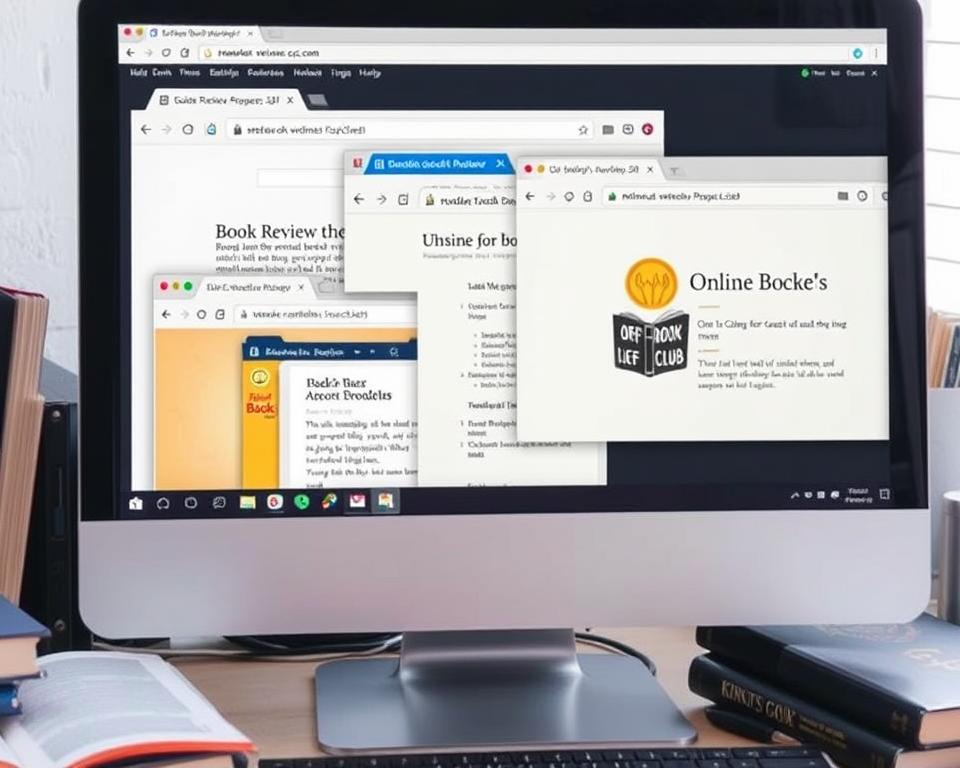Physical Address
304 North Cardinal St.
Dorchester Center, MA 02124
Physical Address
304 North Cardinal St.
Dorchester Center, MA 02124

Love curling up with a good book? What if you could turn those reading hours into actual income? Getting paid to read books isn’t just a bookworm’s fantasy—it’s a legitimate side hustle that combines passion with profit. Whether you’re looking to supplement your income or simply want free books, there are real opportunities to monetize your reading habit.
In this comprehensive guide, we’ll explore how book reviewing works, showcase the most reliable platforms that pay reviewers, and share insider tips to help you land your first paid gig. From freelance reviewing to platform-based opportunities, we’ll cover everything you need to know about turning pages into paychecks.
Before diving into specific platforms, it’s important to understand how the book reviewing ecosystem operates. There are two primary models for getting paid to read books:
As a freelance book reviewer, you’ll work independently, pitching your services to publications, literary magazines, or directly to publishers. This approach offers more flexibility and potentially higher pay rates, but requires strong writing skills and self-promotion abilities. Freelancers typically earn between $25-$100 per review, with established reviewers commanding even higher rates.
Many websites and apps connect reviewers with books needing feedback. These platforms handle the matching process, payment systems, and provide a structured framework. While they offer more stability and regular work, the pay is often lower than freelance opportunities. Platform reviewers typically earn $5-$60 per review depending on the site and book length.
Reality Check: While getting paid to read books is legitimate, it’s rarely a full-time income source. Most successful book reviewers treat it as a supplementary income stream or a way to get free books while earning some extra cash. The real value often comes in building connections within the publishing industry.
We’ve researched and verified these platforms to ensure they actually pay reviewers. Each has its own application process, payment structure, and expectations. Let’s explore your options:
Online Book Club connects readers with self-published authors seeking honest feedback. It’s one of the most accessible platforms for beginners to get paid to read books.
Payment: $5-$60 per review (new reviewers start with free books only)
Requirements: Writing sample, ability to meet deadlines
Review Length: 200-400 words
Kirkus Reviews is a prestigious name in the book review industry. They occasionally hire freelance reviewers for their Indie section, which focuses on self-published books.
Payment: $50-$75 per review
Requirements: Strong writing skills, sample review in Kirkus style
Review Length: 350 words
“Reviewing for Kirkus Indie was fun. I got sent a steady stream of books to recommend, usually 1–2 per month. They often give you a sub-genre or category that you connect well with.”
Booklist is a publication aimed at librarians and provides reviews to help with book purchasing decisions. They hire freelance reviewers for both print and online content.
Payment: $15 per review, $5 for rejected books
Requirements: Writing sample, knowledge of library market
Review Length: 150-175 words
Unique Benefit: Reviews are signed, giving you a published byline to add to your portfolio.

Publishers Weekly is an industry magazine that occasionally accepts reviewer applications. This is one of the more prestigious platforms to get paid to read books.
Payment: $25 per review
Requirements: CV, sample review in PW style
Review Length: 180-200 words
Note: Reviews are not bylined, but this is excellent experience for your resume.
The US Review of Books publishes reviews of both traditionally published and self-published books. They hire freelance reviewers on an ongoing basis.
Payment: $25-$75 per review
Requirements: Writing samples, professional references
Review Length: 500-700 words

If you prefer listening to reading, AudioFile Magazine pays reviewers to evaluate audiobooks and provide feedback on both content and narration quality.
Payment: $10 per review (paid twice yearly)
Requirements: Audiobook listening experience, writing sample
Review Length: Approximately 100 words
Note: You can choose your preferred genres, making this an enjoyable option for specialized readers.
Reedsy Discovery connects reviewers with self-published authors looking for honest feedback. This platform works on a tip-based system rather than fixed payments.
Payment: Tips from readers ($5-$50 per review)
Requirements: Reviewer profile, writing samples
Review Length: 400-600 words
Unique Benefit: Build a following as a reviewer, which can lead to more tips and opportunities.
While NetGalley doesn’t directly pay reviewers, it provides free advance copies of books in exchange for honest reviews. It’s an excellent starting point for building your reviewing portfolio.
Payment: Free books only (no monetary compensation)
Requirements: Active reviewer profile, consistent reviewing
Review Length: Varies by platform where you post
Pro Tip: Use NetGalley to build a strong portfolio of reviews that you can leverage when applying to paid platforms. Publishers notice reviewers who consistently provide thoughtful feedback.
Unlike traditional review sites, getAbstract pays writers to create concise summaries of business, self-help, and nonfiction books. This requires strong synthesis skills.
Payment: $100-$300 per summary
Requirements: Strong writing skills, ability to synthesize complex information
Summary Length: 5-page condensed version of book
Note: This is one of the highest-paying opportunities but also has stringent quality requirements.
eBookFairs connects readers with self-published authors through their Paid Reader Program. After completing two free reviews, you can start earning for subsequent reviews.
Payment: $10 per review (after first two free reviews)
Requirements: Writing samples, ability to provide helpful feedback
Review Length: 300-500 words
Maximum Earnings: Up to $50 total through this program
| Platform | Payment Per Review | Review Length | Difficulty to Join | Payment Speed |
| Online Book Club | $5-$60 | 200-400 words | Easy | 30 days |
| Kirkus Reviews | $50-$75 | 350 words | Moderate | 45 days |
| Booklist | $15 | 150-175 words | Moderate | After publication |
| Publishers Weekly | $25 | 180-200 words | Difficult | Monthly |
| US Review of Books | $25-$75 | 500-700 words | Moderate | Monthly |
| AudioFile Magazine | $10 | 100 words | Moderate | Bi-annually |
| Reedsy Discovery | $5-$50 (tips) | 400-600 words | Easy | Immediate |
| NetGalley | Free books only | Varies | Easy | N/A |
| getAbstract | $100-$300 | 5-page summary | Difficult | 30 days |
| eBookFairs | $10 (after 2 free) | 300-500 words | Easy | 14 days |
Beyond traditional review platforms, there are several other ways to monetize your reading habit:
If you have a pleasant voice and good diction, consider narrating audiobooks through platforms like ACX (Audiobook Creation Exchange). Narrators can earn $50-$200 per finished hour of audio.
Publishers hire sensitivity readers to review manuscripts for cultural accuracy and representation issues. Rates typically range from $50 for short works to hundreds for full manuscripts.
Authors need feedback before publication. Beta readers typically charge $15-$50 per 10,000 words to provide detailed feedback on plot, characters, and overall readability.

Start a book review blog and monetize through affiliate links (especially Amazon), sponsored reviews, and advertising. Successful book bloggers can earn hundreds monthly from multiple revenue streams.
Create a YouTube channel focused on book reviews and recommendations. Monetize through ad revenue, sponsorships, and affiliate marketing. Popular BookTubers can earn thousands monthly.
Use your reading skills to catch errors before publication. Proofreaders typically earn $15-$30 per hour, with experienced professionals commanding higher rates for specialized content.
Breaking into paid book reviewing requires strategy. Here are proven tips to help you succeed:
Join the Freelance Writers Den for access to 300+ hours of training specifically for freelance writers and reviewers. Connect with a community of professionals who share job leads and tips for growing your career.
Yes, getting paid to read books is absolutely legitimate. Publishers, authors, and media outlets need qualified reviewers to evaluate books and provide feedback. However, be wary of scams that promise unrealistic earnings (like 0 per hour). Legitimate opportunities typically pay between – per review for beginners, with specialized services like book summarizing paying higher rates.
Most beginning book reviewers earn between 0-0 per month as a side hustle, reviewing 5-20 books monthly. Experienced reviewers who work with multiple platforms or high-paying publications can earn
Yes, getting paid to read books is absolutely legitimate. Publishers, authors, and media outlets need qualified reviewers to evaluate books and provide feedback. However, be wary of scams that promise unrealistic earnings (like $100 per hour). Legitimate opportunities typically pay between $5-$75 per review for beginners, with specialized services like book summarizing paying higher rates.
Most beginning book reviewers earn between $100-$500 per month as a side hustle, reviewing 5-20 books monthly. Experienced reviewers who work with multiple platforms or high-paying publications can earn $1,000+ monthly. The highest earners typically combine reviewing with other book-related services like editing, sensitivity reading, or maintaining a popular book blog with multiple revenue streams.
Most book review platforms don’t require formal qualifications, but they do look for strong writing skills, attention to detail, and the ability to meet deadlines. A degree in English, Journalism, or related fields can help with higher-paying opportunities, but it’s not essential. What matters most is your ability to write clear, insightful reviews and your knowledge of literary conventions in your chosen genres.
Reading the book typically takes 4-8 hours depending on length and complexity. Writing the actual review usually takes 1-3 hours for experienced reviewers. For a 300-word review of an average novel, the entire process might take 5-10 hours total. This means that even at $50 per review, your hourly rate might be $5-10 when starting out. Efficiency improves with experience.
Most paid review platforms assign specific books they want reviewed, so you generally can’t choose books you’ve already read. However, some platforms like Online Book Club allow you to select from available titles. Book bloggers and independent reviewers have more flexibility to review previously read books, especially when building a portfolio.
,000+ monthly. The highest earners typically combine reviewing with other book-related services like editing, sensitivity reading, or maintaining a popular book blog with multiple revenue streams.
Most book review platforms don’t require formal qualifications, but they do look for strong writing skills, attention to detail, and the ability to meet deadlines. A degree in English, Journalism, or related fields can help with higher-paying opportunities, but it’s not essential. What matters most is your ability to write clear, insightful reviews and your knowledge of literary conventions in your chosen genres.
Reading the book typically takes 4-8 hours depending on length and complexity. Writing the actual review usually takes 1-3 hours for experienced reviewers. For a 300-word review of an average novel, the entire process might take 5-10 hours total. This means that even at per review, your hourly rate might be -10 when starting out. Efficiency improves with experience.
Most paid review platforms assign specific books they want reviewed, so you generally can’t choose books you’ve already read. However, some platforms like Online Book Club allow you to select from available titles. Book bloggers and independent reviewers have more flexibility to review previously read books, especially when building a portfolio.
Getting paid to read books won’t make you rich overnight, but it can provide a rewarding side income while allowing you to indulge in your reading passion. The key is to start building your portfolio, apply to multiple platforms, and continuously improve your reviewing skills.
Begin with free platforms like NetGalley to build samples, then gradually apply to paid opportunities that match your interests and expertise. With persistence and quality work, you can establish yourself as a trusted reviewer and open doors to higher-paying opportunities in the publishing world.
Start by creating a free account on NetGalley to build your portfolio, then apply to Online Book Club for your first paid reviewing opportunity!
Remember that the most successful book reviewers are those who genuinely love reading and can communicate their thoughts clearly and insightfully. Let your passion for books shine through in your reviews, and you’ll find both personal satisfaction and financial rewards in this unique side hustle.